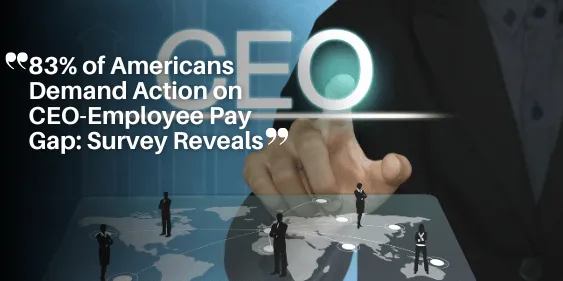83% of Americans Demand Action on CEO-Employee Pay Gap: Survey Reveals

The debate over CEO compensation is heating up, and for good reason.
Recent surveys show that a whopping 83% of Americans think it’s crucial to reduce the pay gap between CEOs and average workers.
Yet, only 13% believe companies are managing this issue effectively. In 2022, CEOs were raking in amounts 185 times larger than what median employees earned.
Alarming Disparities
One of the most staggering revelations is the sheer scale of this disparity.
While the median employee’s pay increased by just $4,300 last year, CEOs saw their compensation skyrocket by $1.5 million.
To put it in perspective, a typical employee would need 196 years to make what a CEO earns in a single year.
This isn’t just a statistic; it’s a flashing red light signaling a deep-rooted issue in modern corporate culture.
Public Outcry
The public’s irritation with this imbalance is palpable. The Bentley University-Gallup poll reveals how most Americans—across age, gender, and political affiliations—agree on the importance of tackling this issue.
The sentiment is strong and clear. Despite generational differences, with 70% of those aged 18-29 and 63% of those 60+ sharing negative views on corporate efforts, the consensus is unusually coherent.
A Call for Change
Given these alarming figures and public dissatisfaction, there’s a growing demand for enhanced accountability and transparency in corporate governance.
The message is loud and clear: it’s time for businesses to reassess their compensation structures seriously.
This isn’t just a financial issue; it’s also a matter of fairness and morality that impacts corporate culture and employee morale.
Businesses must heed these signals to regain public trust and ensure a fairer distribution of wealth within their organizations.
Addressing this pay gap could be an essential step toward a more equitable future for all employees.
Public Perception Across Demographics
Consistent Views Across Age Groups and Genders
The overwhelming concern about the CEO-employee pay gap transcends age and gender divides.
Both young and old agree that the disparity is a pressing issue. According to a Bentley University-Gallup poll, 70% of individuals aged 18-29 believe that companies are doing a poor job managing this gap, a sentiment echoed by 63% of those aged 60 and above.
Gender differences also show a similar trend, with 67% of men and 65% of women agreeing that companies are failing in this area.
This widespread agreement highlights a significant, united call for change.
Political Consensus
Interestingly, reducing the CEO-employee pay gap has garnered political consensus across party lines. According to the poll, 96% of Democrats, 83% of independents, and 67% of Republicans agree that addressing this pay gap is crucial.
This broad agreement across political spectra indicates the universality of the concern and the public’s demand for effective solutions from companies and lawmakers alike.
Generational Perspectives
Generational perspectives further illustrate the widespread dissatisfaction with how companies handle CEO compensation.
While younger individuals may have higher expectations for corporate accountability, older generations share in the criticism.
Both groups consistently rate companies poorly in this regard, underscoring that this issue cuts across different life stages and experiences.
The consistent sentiment across demographics highlights the urgent need for businesses to revisit their compensation strategies, reflecting a shared demand for fairer pay structures.
The Widening Pay Gap
The CEO-employee pay gap continues to grow, shedding light on a critical disparity within the corporate world.
In 2022, the contrast in earnings became even more pronounced, with CEOs taking home $1.5 million more compared to a mere $4,300 increase for the median employee.
This alarming discrepancy captures the essence of inequality many find deeply troubling.
The enormity of this gap is staggering. To put it in perspective, a typical employee would need to work 196 years to equal the annual salary of a CEO.
Such a divide not only reflects financial inequality but also fuels a sense of unfairness and dissatisfaction among the workforce.
The consistent escalation in the pay gap signals that this issue is far from being resolved and is, in fact, worsening.
Addressing this imbalance isn’t just a financial concern; it is a matter that touches upon broader societal values of fairness and justice.
Tackling this issue will require a reexamination of current compensation structures and a concerted effort to establish more equitable practices in our corporate world.
Impact on Corporate Culture and Trust
The disparity in CEO-employee pay sails beyond mere numbers, penetrating deep into the corporate psyche and fabric.
Exorbitant CEO pay not only skews financial equity but also chips away at the very trust that forms the cornerstone of cohesive corporate culture.
Eroding Institutional Confidence
Excessive CEO compensation casts a shadow over the integrity of corporate institutions.
When top executives earn astronomically more than the average worker, it fosters a sense of deep-rooted unfairness.
This disparity is particularly jarring for working-class individuals who feel the bite of wage stagnation and rising living costs.
Nell Minow, vice chair of ValueEdge Advisors, notes, “CEO pay is an outrage. It hugely undermines confidence in our institutions”.
This perception of injustice can lead to widespread cynicism and reduced confidence in corporate leadership.
Impact on Employee Morale
A glaring pay gap can severely hamper employee morale. The inequity can foster a sense of resentment and disillusionment among workers who feel undervalued and overlooked. Bill George, former CEO of Medtronic, expressed concern over the long-term implications, stating that excessive executive pay could lead to a significant “loss of trust” within the company.
Employee engagement and productivity may suffer as workers question the fairness of their own compensation relative to that of their leaders.
Cultural Ramifications
The cultural implications of disproportionate CEO pay cannot be overlooked. It can create a cultural divide between the executive suite and the rest of the company.
This fracture may manifest in various ways, including reduced collaboration, increased turnover, and diminished loyalty.
As Cynthia Clark from Bentley University points out, “Instinctively, it doesn’t seem fair” for a CEO to earn so much more than their employees.
Addressing this cultural rift is crucial for maintaining a harmonious and motivated workforce.
Navigating these multifaceted challenges requires astute leadership and an unwavering commitment to fairness.
With public sentiment increasingly unforgiving, the onus is on corporate boards to navigate this complex terrain judiciously.
Legislative Efforts and Disclosure Requirements
Tax Excessive CEO Pay Act
To address the growing dissatisfaction with CEO compensation, progressive lawmakers, notably Senators Bernie Sanders and Elizabeth Warren, proposed the Tax Excessive CEO Pay Act.
This legislation aims to impose higher taxes on companies whose executives earn at least 50 times more than their median employees.
This move reflects a significant attempt to close the widening pay gap through policy measures.
However, corporate boards argue that hefty compensation packages are essential to attract and retain top talent who can drive the company’s success.
Public Disclosure and Its Effects
Since 2017, public companies have been mandated to disclose the ratio between CEO pay and that of the median employee.
This transparency was anticipated to narrow the CEO pay gap by highlighting the disparities.
Yet, results have been mixed. Instead of reducing pay, this data has sometimes fueled higher salary demands, as CEOs leverage information about their peers’ compensation to negotiate better packages.
This trend underscores the competitive nature of executive compensation, where higher earnings become a status symbol.
Accountability and Blame
The issue of CEO pay isn’t solely a corporate board’s responsibility. Shareholders and the media also play crucial roles in addressing this problem.
Shareholders have been criticized for being too lenient, and the media has often failed to hold directors accountable.
As sentiments of unfairness grow, it is imperative for businesses to reassess their compensation structures and explore more equitable practices.
Balancing talent attraction while ensuring fairness remains a challenging but essential task.
Challenges in Addressing the Issue
Balancing Talent Attraction and Fairness
One of the key challenges corporate boards face is striking a balance between attracting top-tier talent and ensuring fairness in compensation structures.
High executive compensation packages are often justified on the grounds that they are needed to lure the most capable leaders.
Companies argue that competitive pay is essential for CEOs who can drive business success.
However, this reasoning has led to skyrocketing CEO salaries, which many view as unreasonably high.
Competitive Nature of Executive Compensation
The culture of competitive executive compensation has also made it difficult for companies to curb excessive pay.
Being listed among the highest-paid CEOs has become a status symbol, with executives often using publicly disclosed pay data to negotiate even higher salaries.
This self-perpetuating cycle can exacerbate the pay gap rather than mitigate it.
Accountability and Transparency in Corporate Governance
Another significant hurdle is the need for enhanced accountability and transparency in corporate governance.
While mandatory disclosures of CEO-employee pay ratios have been required since 2017, the impact has been mixed.
Transparency was intended to narrow the pay gap, but it has sometimes led to higher pay demands among executives who compare their compensation with industry peers.
Ultimately, addressing the CEO pay gap requires a multifaceted approach that considers both the necessity of talent retention and the ethical implications of vast income disparities.
By focusing on transparency and fairness, companies can start to rebuild public trust and reshape corporate culture.






